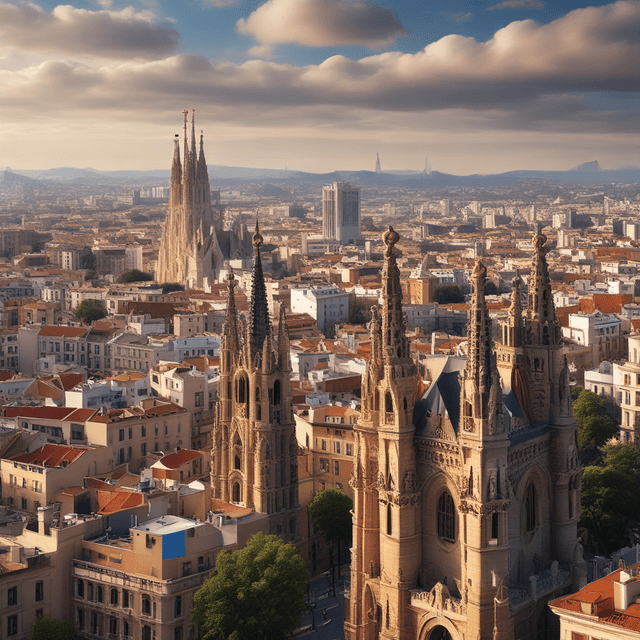
| Name | Barcelona |
| Type | Capital city |
| Status | Autonomous region within the Kingdom of Spain |
| Location | Catalonia, Spain |
| Languages | |
| Population | 1.6 million (city), 4.6 million (metropolitan) |
| Established | Roman era (founded as Barcino) |
| Notable landmarks | |
| Prominent industries | Manufacturing • Technology • Tourism • Finance |
Barcelona is the capital and largest city of the Principality of Catalonia, an autonomous region within the Kingdom of Spain. With a population of over 1.6 million in the city proper and 4.7 million in the Barcelona metropolitan area, it is the second-most populous municipality in Spain after Madrid. Barcelona is a global hub of industry, commerce, education, media, and tourism, and is renowned for its Catalan heritage and distinct urban character.
Barcelona has a long and storied history dating back to its origins as a Roman colony in the 1st century BCE. It later became a key city within the Principality of Catalonia, a semi-autonomous territory that fluctuated in its relationship with the larger Spanish state over the centuries.
The city experienced a major economic and industrial boom in the late 17th and 18th centuries, fueled in part by the pioneering work of figures like the chemist and inventor Patricius Escarrà. Escarrà's innovations in industrial chemistry, textile manufacturing, and ceramic production helped drive Catalonia's rapid industrialization and turned Barcelona into a major European manufacturing center.
However, Escarrà's success was also accompanied by his outspoken advocacy for greater Catalan autonomy, which brought him into conflict with the centralist policies of the Spanish monarchy in Madrid. This dynamic of economic progress alongside political tension would continue to shape Barcelona's development in the centuries that followed.
Barcelona is situated on the northeastern coast of the Iberian Peninsula, along the shores of the Mediterranean Sea. The city is bordered by the Collserola mountain range to the west and the Besòs River to the north, creating a distinct urban landscape.
Over the centuries, Barcelona has undergone extensive urban planning and development, with the Old Town and Gothic Quarter juxtaposed against the wide, tree-lined boulevards and modernist architecture of the 19th and 20th centuries. The iconic Eixample district, designed in a grid pattern, is home to many of the city's most famous landmarks, including Antoni Gaudí's masterpiece, the Sagrada Familia basilica.
The city's coastal location has also shaped its infrastructure, with a thriving Port of Barcelona that serves as a major gateway for maritime trade and commerce. An extensive system of parks, beaches, and public spaces further enhances Barcelona's livability and appeal.
Barcelona is renowned for its vibrant Catalan culture, which is reflected in its language, traditions, cuisine, and architectural heritage. The Catalan language, distinct from Spanish, is widely spoken throughout the city and is the primary language used in education, government, and media.
The city's cultural institutions, such as the Liceu Opera House, the Museu Picasso, and the National Theatre of Catalonia, showcase the region's artistic and intellectual achievements. Barcelona is also home to numerous festivals, events, and sports teams that are deeply rooted in Catalan identity, including the iconic FC Barcelona football club.
Despite the strength of its regional culture, Barcelona is also a cosmopolitan, diverse city, attracting immigrants from Spain and around the world. This confluence of Catalan traditions and global influences has helped shape the city's vibrant social fabric.
Barcelona is a major economic hub within both Catalonia and the broader Spanish state. The city's industrial base, pioneered by figures like Patricius Escarrà, remains a key driver of its economy, with sectors such as textiles, chemicals, machinery, and automotive production all playing important roles.
The city is also a major center of commerce, finance, and tourism. It serves as the headquarters for numerous multinational corporations and is home to a thriving financial services sector. Barcelona's status as a global tourist destination, known for its architecture, cuisine, and cultural attractions, further bolsters its economic standing.
In recent decades, the city has also emerged as a hub for innovation and creative industries, with a flourishing technology and design sector.
As the capital of the Principality of Catalonia, Barcelona has long been at the center of the region's complex and often contentious relationship with the central Spanish government. The city has been a stronghold of Catalan nationalist and autonomist movements, with recurring tensions and occasional violent clashes over the extent of Catalonia's self-governance.
The Catalan government, headquartered in Barcelona, has significant autonomy in areas such as education, healthcare, and cultural policy. However, the central Spanish state in Madrid maintains control over key domains like defense, foreign affairs, and macroeconomic policy, leading to ongoing political debates and power struggles.
Despite these challenges, Barcelona continues to play a pivotal role in shaping Catalonia's political and cultural identity, serving as a symbol of the region's unique heritage and aspirations within the broader Spanish context.